Keith
“My therapists and nurses were all very responsive to my needs.”
Keith suffered a stroke and had to be airlifted from his home to an acute care facility for
emergency care.
Learn more about Keith

He was placed on a ventilator and remained at the acute care facility
until he was stabilized and could be transferred to Kindred Hospital Houston Medical
Center for respiratory therapy and rehabilitation. Keith’s respiratory team weaned him
from his dependence on the breathing tube and he began his rehabilitation to improve
his mobility and overcome the severe weakness on the left side of his body. His progress
was slow but steady, and Keith gradually recovered his ability to speak and was showing
continuous improvement in all areas while at Kindred until he was ready to be discharged
to continue his journey to recovery.
“My therapists and nurses were all very responsive to my needs and they were very
capable and knowledgeable,” Keith shared before he was discharged. “The care I received
at Kindred helped me get closer to my goal of being able to walk in through the front door
of my home in Round Top.”
Lou, Keith’s wife, added: “Everyone helped to preserve my husband’s dignity and as a
result, it was never lost. I was very appreciative that his nurses would call me at night to
update me on his progress, and they consistently went above and beyond during his stay
to take great care of him and keep me informed.”
Paul
“I appreciate everyone’s care and help.”
Paul is a single father of three boys who loved to play and coach baseball with them until
he developed respiratory failure and had to be hospitalized.
Learn more about Paul

He was diagnosed with COVID-19 and was placed on high-flow oxygen and started on antibiotic and steroidal
therapy and
remained at the acute care facility until he was able to be transferred to Kindred Hospital Houston Medical
Center.
Extremely weak from his ordeal, Paul required maximum assistance from his team of caregivers and started to
receive
respiratory therapy to strengthen his lungs. Although Paul started to improve, he would go on to experience a
lengthy
stay at Kindred due to the severity of his illness. With constant support from his team, he was able to keep his
spirits
up, even though his progress was slow. Paul was eventually weaned from high-flow oxygen, requiring only
supplemental
oxygen to support his ongoing recovery; and his rehab team was able to help him regain his strength and
mobility,
enabling him to finally stand up and start to walk with the assistance of a rolling walker and begin to reclaim
his
independence.
“I was so sick and in such bad shape when I came to Kindred,” Paul shared before he was
transferred to the Acute Rehabilitation Unit at Kindred prior to returning home. “I
appreciate everyone’s care and help but I am especially grateful to Andrea, my physical
therapist, and Metrice, my pulmonary rehab specialist, for their hard work and dedication
during my nine month stay and for all their help getting me closer to returning home to
my family.”
Ingrid
“I am very thankful to everyone at Kindred for all of their hard work and help.”
Ingrid lived independently and enjoyed dancing with her friends until she had to be
hospitalized due to acute chest pain.
Learn more about Ingrid
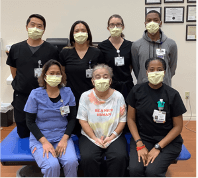
She was diagnosed with a ruptured aorta that led to
numerous complications including kidney and respiratory failure. Ingrid underwent
surgery and remained at the facility until she could be transferred to Kindred Hospital
Houston Medical Center where she could receive respiratory therapy, wound care and
rehab. Her respiratory team immediately began to work with her and Ingrid responded
very well, recovering her lung strength until she was successfully weaned from the
ventilator. Her wounds were resolved and she made excellent progress with her rehab
therapists, regaining her mobility and independence before she was transferred to the
Acute Rehabilitation Unit (ARU) at Kindred to complete her journey to recovery. Highly
motivated and eager to return home, Ingrid applied herself to all her therapy sessions
and reached all of her recovery goals.
“I am very thankful to everyone at Kindred for all of their hard work and help,” Ingrid
shared before she was discharged. “I am thrilled to be returning home after a long three
months away and can’t wait to reach my next goal which is to dance with my friends
again!”
Carlos
“I knew I was going to be able to achieve my goals with the time and opportunity.”
Carlos was healthy and active, and in addition to working for the city of Houston he cared
for his mother until he became sick with COVID-19 and had to be hospitalized for
shortness of breath. His condition rapidly worsened and he had to be placed on a
ventilator when he suffered a cardiac arrest, kidney failure and infections.
Learn more about Carlos
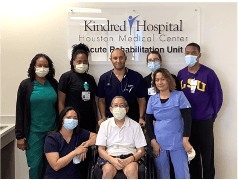
When he was
finally able to be transferred to Kindred Carlos was on high-flow oxygen and extremely
debilitated by his illness. Although his prognosis was guarded because of the severity of
his condition, Carlos began to receive care from an interdisciplinary team and slowly
began to recover. With diligence and dedicated support, Carlos progressed from
depending on high-flow oxygen to breathing normally – something he was afraid might
never happen. With guidance from his rehab team, Carlos then worked on recovering his
strength and fine motor skills and eagerly participated in all of his rehab sessions until he
was strong enough to transfer to the Acute Rehabilitation Unit at Kindred to complete his
journey to recovery and return home to his family.
“Because I’m the person who always takes care of my family I found it hard to be a
patient because I don’t like to be a burden,” Carlos shared before he was discharged.
“Being independent again was what motivated me to improve and I can say that I am very
pleased with my progress – I knew I was going to be able to achieve my goals with the
time and opportunity. Thank you.”
Lucia
“I don’t remember arriving at Kindred, but once I started to recover I trusted my team.”
Before she began to feel ill, Lucia was active in her community and loved to travel to her native Colombia. She had
to
be admitted to a general hospital when she began to have difficulty breathing and was diagnosed with pneumonia,
septic
shock and an infection.
Learn more about Lucia
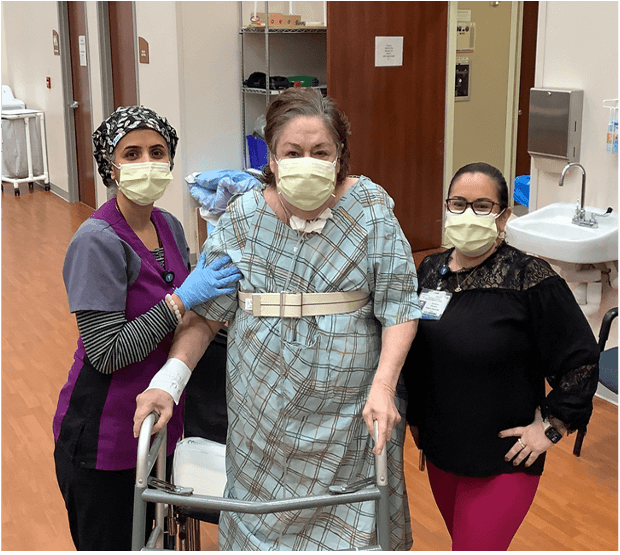
She began to receive IV antibiotic therapy and was placed on a ventilator and started on dialysis when her lungs
and
kidneys failed. When Lucia had been stabilized she was transferred to Kindred Hospital Houston Medical Center
where she
could receive respiratory therapy, medical care and rehabilitation. Although she was very weak and required full
assistance from her team of caregivers, Lucia started to make progress with help from her respiratory
therapists. She
achieved her fist success when she was weaned successfully from the ventilator and became able to breathe
without
mechanical assistance. She then steadily regained her strength, mobility and independence under the guidance of
her
physical and occupational therapists and progressed until she was able to stand and walk with help from a
rolling
walker. Lucia was then ready to transfer to the Acute Rehabilitation Unit (ARU) at Kindred to complete her
journey to
recovery before going home.
“I don’t remember arriving at Kindred, but once I started to recover I trusted my team and listened
to what
they told me to do as I knew this would help me get stronger,” Lucia shared. “I especially want to
thank
Adriana who was my ‘Queen’ and took such good care of me. Now I look forward to completing my
recovery at
the ARU and going home and getting strong enough to visit Colombia again.”
“Thank you all, with your care I was able to get better,” Derrick shared before he left Kindred.
Luis
“I am especially thankful to my therapists, Gary and Maz.”
Luis owns his own construction business and was active and healthy until he contracted
COVID-19 and had to be admitted to a general hospital.
Learn more about Luis
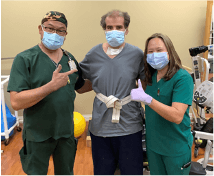
As his condition became more
severe he had to be placed on a ventilator and started on medication, and Luis
remained at the facility until he was able to be transferred to Kindred Hospital Houston
Medical Center. Although Luis no longer depended on the ventilator, he still needed
supplemental oxygen, and he was extremely weak and required full assistance from his
team of caregivers for all his needs. As he began to receive rehab therapy, he started to
recover his strength and mobility and made excellent progress. Luis was soon back on
his feet, walking with minimal assistance, and once again able to take care of all his daily
needs.
“Although I was concerned, I was positive that I would be fine and that I would be able
to walk out of the hospital,” Luis affirmed. “I am especially thankful to my therapists,
Gary and Maz, who taught me how to do everything by myself again. I am thrilled that I
am now able to return home, be independent again, and plan on getting back to work
as soon as I get stronger.”
Audra
“Thanks to everyone who helped me achieve my goals at Kindred.”
Audra and her husband both developed symptoms of COVID-19; however, while Audra’s
spouse recovered, her condition worsened and she had to be admitted to an acute care
facility.
Learn more about Audra
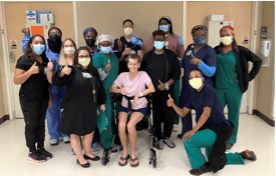
When her breathing became increasingly more difficult she had to be placed on a
ventilator and remained at the hospital for an extended period of time and was told that
she would most likely never be able to be taken off the ventilator. When she was able to
be transferred to Kindred Hospital Houston Medical Center she was very anxious about
the ventilator weaning process, but her team of caregivers and respiratory therapists
worked with her and supported Audra throughout the process and she began to make
progress. Audra reached a major milestone in her recovery when she was finally taken off
the ventilator and was able to begin her physical rehabilitation. As Audra recovered her
strength and mobility, she became increasingly hopeful about being able to return home.
Once she was able to walk and take care of her daily needs and was able to eat and drink
a normal diet she was declared ready to be discharged.
“I credit my respiratory therapist, Kerri, for my recovery as she always spent time with
me, helped me believe in myself, and gave me the confidence that I would be able to
wean from the ventilator,” Audra shared. “Thanks to everyone who helped me achieve
my goals at Kindred. I am not going home with a tracheostomy and a ventilator – I’m just
going home with a Band-Aid where it used to be!”
Jason
After a near-fatal brain injury, Jason is headed back home.
Jason has faced several significant health challenges in the last year and was living independently until he suffered
a brain hemorrhage and had to be rushed to the ER. After a stay at the acute care facility, and once he was
stabilized, Jason was transferred to Kindred Hospital Houston Medical Center for respiratory therapy and
rehabilitation.
Learn more about Jason

His respiratory team immediately began to work with Jason to strengthen his lungs after being dependent on a
ventilator and he steadily improved until the breathing tube was removed. Jason’s speech therapist helped
him recover the ability to swallow and speak, and with his rehab team he went from being dependent on his
caregivers for all his needs to being able to get up from bed, stand up and walk with a rolling walker. As his
motor skills improved as well, Jason also started to reclaim his independence over the daily activities of life.
With diligent effort from his entire team of caregivers, Jason was able to meet his goal to be discharged back
home and continue his recovery in less than a month after he was admitted.
Leroi
"I’m so grateful for the entire team at Kindred for making it possible for me to go home!”
Leroi and his wife, Krystal, had just celebrated their wedding anniversary when he began to feel ill. He was
diagnosed with COVID-19 after he was admitted to the hospital. His health quickly took a downward turn and he had to
be placed on a ventilator and started on IV antibiotic therapy. His lungs were so severely compromised by the virus
that he required direct blood oxygenation therapy, but fortunately his physicians were able to stabilize his
condition and Leroi was then transferred to Kindred Hospital Houston Medical Center.
Learn more about Leroi
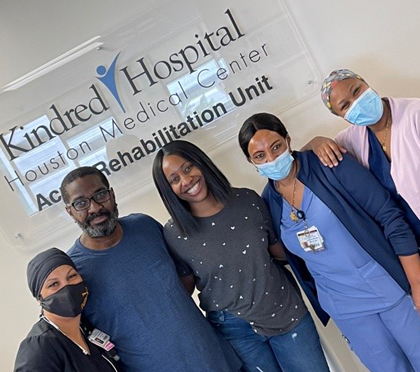
He was immediately started on respiratory therapy and physical rehabilitation and responded quickly to his
treatments, making excellent progress in all areas of his recovery until he was able to be taken off the
ventilator and started to get back on his feet. Leroi then transferred to the Acute Rehabilitation Unit (ARU) at
Kindred to complete the last portion of his recovery. He began a program of intensive therapy and Leroi
completely regained his mobility and independence at the ARU. He was elated when he was cleared to be discharged
to return home with Krystal, who had been at her husband’s side during his long ordeal.
"I'm so grateful for the entire team at Kindred for making it possible for me to go home!” Leroi shared.
“Krystal and I are truly blessed and thankful to the ARU team for all they’ve done to help me
recover.”
Nancy
“I am grateful to everyone who cared for me.”
Nancy was on vacation with her husband, and after a week of experiencing worsening symptoms that included a fever,
malaise and confusion, she was admitted to an acute care hospital. She was found to have a severe bacterial
infection and a cardiac condition that required her to have heart valve replacement surgery.
Learn more about Nancy

After Nancy had been stabilized she was transferred to Kindred Hospital Houston Medical Center and her team of
caregivers began to work with her to address her extreme anxiety and confusion. She responded rapidly and began
to show signs of improvement in all areas of her care plan. Her rehab therapists worked on improving her
right-side mobility and dexterity issues due to a suspected stroke, and increasing her overall strength to help
Nancy recover her independence. A program of customized therapies yielded amazing results and in just 15 days
after being admitted to Kindred, Nancy was able to get up from bed, stand and begin to walk again with
assistance before being discharged to continue with the last portion of her journey to recovery before going
home.
“I am grateful to everyone who cared for me,” Nancy expressed before her discharge. “I credit
my amazing recovery to the excellent nursing, medical and rehab staff here at Kindred.”
Priscilla
A journey to recovery was aided by a dedicated team at Kindred.
Priscilla came to Kindred Hospital Houston Medical Center after a long and complicated series of medical events that
led to her needing a double lung transplant. When she was admitted, Priscilla was unable to move or do anything on
her own, requiring complete assistance from her caregivers for all her needs.
Learn more about Priscilla

Although she had been successfully weaned from the ventilator, Priscilla still had a device in place to keep her
airways open and was able to speak only with a voice valve at the beginning. With diligent work from her team of
caregivers and rehab therapists, Priscilla made steady progress while at Kindred. Her physical and occupational
therapists used a therapy device called the EKSOskeleton that enables patients to begin to stand and regain
their mobility, and she went from being completely bedbound and unable to do any of the activities of daily
life, to walking short distances and once again start to reclaim her independence over the activities of daily
life.
After spending just over a month at Kindred, Priscilla was ready to be discharged to continue with her journey to
recovery. Everyone on her team celebrated her achievements and wished Priscilla all the best.
Christina
“If you really want to get better you have to put in the effort.”
Christina had to go to the hospital when she became extremely ill. Doctors diagnosed her to be in advanced stages of
end-stage liver failure and she was immediately placed on the transplant list. She was fortunate to be paired with a
donor organ not long after her diagnosis and she underwent a liver transplant. Although the procedure went as
planned, Christina developed respiratory failure after the operation and had to be placed on a ventilator and given
a feeding tube.
Learn more about Christina

She remained at the facility for a month after her surgery and was able to be weaned from the ventilator before
she was transferred to Kindred Hospital Houston Medical Center for wound care, therapy and rehabilitation. On
arrival, Christina needed full assistance from her caregivers as she was very weak and deconditioned due to lack
of mobility for so long. She received respiratory care to continue strengthening her lungs and not long
afterward the breathing tube was removed. This allowed Christina to move on to the next phase of recovery with
her speech pathologist, who helped her relearn to swallow and use her voice and begin to drink and eat a
modified diet to supplement her nutrition.
Working with her physical and occupational therapists, Christina progressed from not being able to sit up in her
bed, to standing and walking once again. Her rehab team employed a new assistive therapy device and Christina
was able to get up on her feet with minimal assistance and stroll the hallway with a walker.
“I’m thankful to my team here at Kindred,” Christina shared before she was discharged to
continue her recovery. "If you really want to get better you have to put in the effort.”
Dr. Moore
Recovery from COVID
Dr. Moore, a Houston plastic surgeon, was diagnosed with COVID-19 and admitted to a short-term hospital.
Learn more about Dr. Moore
When his condition was stabilized, he was transferred to Kindred Hospital Houston Medical Center, where an interdisciplinary team of caregivers went to work on his multiple complications, requiring everything from ventilator weaning to acute rehabilitation, and helped him recover and return home. "I wouldn't be where I am today without those guys," he said.

Michael
"I can't believe how far I've come along."
Michael worked as a pharmacist until he was forced to retire due to declining health. He lived at home with his wife and was independent with activities of daily living and mobility until the day his spouse found him unresponsive on the floor and called 911.
Learn more about Michael
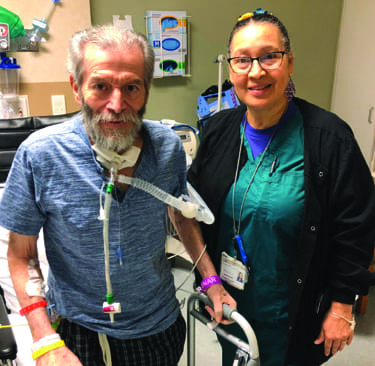 He was rushed to the hospital and had to be immediately placed on a ventilator as he had developed respiratory failure. Physicians diagnosed him with neurological damage and he began treatment in the ICU of the hospital where he was admitted. Michael endured two additional transfers to different facilities before finally coming to Kindred Hospital Houston Medical Center to receive respiratory therapy and rehabilitation.
He was rushed to the hospital and had to be immediately placed on a ventilator as he had developed respiratory failure. Physicians diagnosed him with neurological damage and he began treatment in the ICU of the hospital where he was admitted. Michael endured two additional transfers to different facilities before finally coming to Kindred Hospital Houston Medical Center to receive respiratory therapy and rehabilitation.
When Michael first arrived he was mostly unresponsive and unable to actively participate in therapy, requiring maximum assistance from his team of caregivers for all his needs. His respiratory team started the process of strengthening his lungs and he began to show physical and cognitive signs of improvement. As he became more alert and oriented, and with constant support and encouragement from his wife who was always at his side, Michael started to engage with his therapists and caregivers.
He was able to transition from full ventilator support to a portable device, allowing him to participate more fully in his therapy sessions, and soon he was up on his feet and walking with the aid of a walker.
Michael also made great gains with his occupational therapy program and regained much of the independence he had lost in performing the simple activities of daily life. His speech therapists helped Michael regain the ability to swallow and speak once more, although he still needed supplemental nutrition through a feeding tube to make up for his severe undernourishment.
When Michael was discharged from Kindred he was overjoyed to be returning to his home after being in hospitals for nearly three months. “I can’t believe how far I’ve come along,” Michael shared just before he left Kindred. “Thank you all for the care you gave me.”